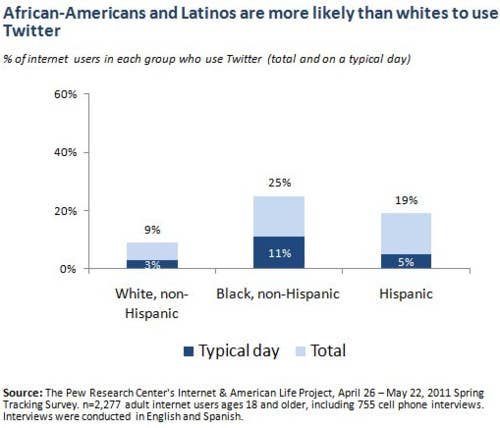
Here's a fascinating detail in a new Pew study, flagged by Stowe Boyd:
Perhaps most intriguing is the demographic gap: 25% of African-Americans and 19% of Hispanics use the service, compared with 9% of Non-Hispanic Whites. Perhaps linked to the use of entertainment and cultural leaders?
That’s a correlated explanation, but not a causal one. Let’s go deeper.
The real explanation is as historical as the results are pervasive. African Americans and Hispanics have always over-indexed in terms of Twitter usage, or any usage primarily driven by mobile devices (see PEW’s research study regarding SMS usage). It’s not simply over-indexing by percentage of daily/monthly active users for the demographic; there've been reports that African Americans account for 25% of all U.S. Tweets in terms of volume while being only 13% of the population. This last fact can be seen anecdotally when witnessing the pervasive number of urban themed hashtag memes.
As I've told many clients: Twitter is the black 4chan.
Why? Entertainers and cultural leaders are the effect, but not the cause. We have to go back to the 80s & 90s, back to the earliest phases of the consumer facing web and the so-called “digital divide” between white and African American/Hispanic communities in terms of computer and internet adoption.
The problem with the digital divide argument is that it wasn’t inclusive of all digital usage and only measured computer usage. Urban communities have smaller homes, with apartments that might accommodate but one computer. If present, that computer, typically, would be in a public area of the home — a family room, a living room — thus all usage would be “public.” However, at the time, most of the internet’s usage growth occurred in private, where people tried on identities, utilized pseudonyms, connected with strangers, consumed the unthinkable, and engaged in fantasies in a world that began and ended at the dial tone.***
Beepers, Motorola 2-Ways, Sidekicks, Blackberrys and now smartphones bridged this privacy gap, allowing urbanites to enjoy in device driven fantasy. It’s from this you get beeper codes, technology as fashion accessory, and friend/follower accumulation as proxy for social proof. If it worked for suburban doctors, it also worked for the urban street pharmacists and those who postured as either one. Overlay the ostentatious, aspirational, entrepreneurial and self-promotional culture of hip-hop and you create a gigantic viral loop from the bedroom to the streets to the clubs to the small and big screens propelling mobile technology to iconic status in black America.
Clearly, when Twitter hit in 2006/2007, you had an entire community predisposed to and trained on short form communication for nearly twenty years. Though there was a lag, the real African American usage on Twitter took off in 2008/2009 with native ad-supported Blackberry applications that were always (hip-hop culture is synonymous with embedded brand messaging).
So, the dirty secret of the mobile phone and app industry is that African Americans (and Hispanics, females, and southerners demographically according to PEW) are a leading indicator for mainstreaming mobile social features. There’s a reason why carriers created AMP’d and Boost Mobile instead of Skinny Jeans or Fixie+Facial Hair Mobile — historical content consumption/generation patterns, embedded knowledge, and fertile established viral graphs.
=====
*** After SixDegrees introduced us to the concept of a social network in 1997, the next three social networks of size were all minority focused ones created by Community Connect in 1999 - Asian Avenue, Black Planet and Mi Gente - all predating Friendster by 3 years. It should come as no surprise that this early adoption translated to over-indexing on future social network services also.
Greg Battle is an innovation consultant in NYC focusing on revenue and customer discovery for web and mobile services such as bitly, Best Buy, GroupMe, Beats by Dr. Dre and Turntable.fm. Follow him on @gbattle, leftovertakeout.com and gregbattle.com
This post was originally posted on LeftoverTakeout, and reposted here with the author's permission. It has been (slightly!) edited for context.
